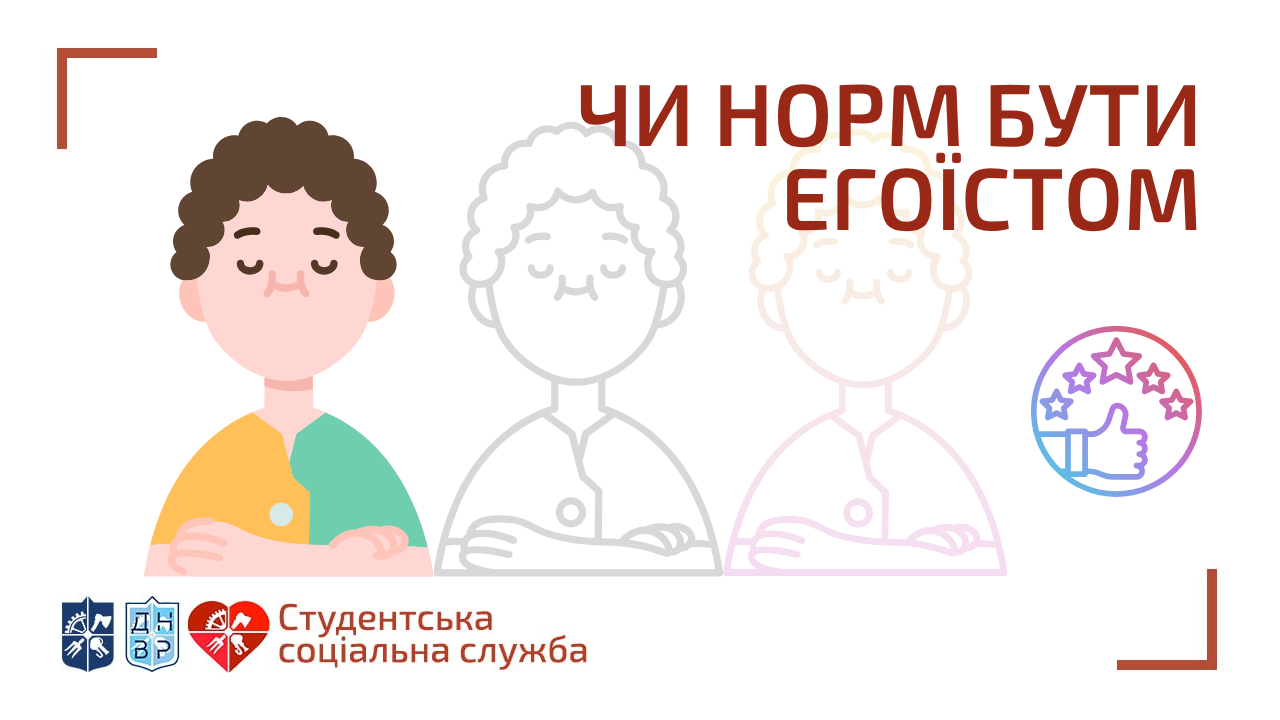Many people are accustomed to thinking that selfishness is a negative trait. They believe that a selfish person is someone who only thinks about themselves, disregards the needs of others, and prioritizes their interests above all else. That's what we were taught in school, it's written in dictionaries, and older people repeat it. But is “thinking about yourself” always a bad thing? What if caring for yourself is not selfishness, but common sense?
In this article, we will discuss:
- How selfishness is interpreted in Ukrainian and American dictionaries.
- What is rational selfishness?
- Why is this concept so important for students?
In everyday language and official interpretations, selfishness is often equated with moral deficiency:
| Source | Definition |
| Dictionary of the Ukrainian Language (SUM) | Selfishness is “excessive love for oneself, the pursuit of personal gain, disregard for the interests of others.” |
| Oxford English Dictionary | Selfish - caring only about yourself rather than about other people. |
All these definitions have one thing in common: Selfishness is presented as an antisocial, immoral, or harmful way of thinking and behaving..
But Ayn Rand, an American philosopher and writer, proposed a different understanding — rational selfishness.
She is the author of the philosophy of objectivism, the trilogy Atlas Shrugged, and many other works, which call for living consciously, thinking critically, and building a life based on one's own values rather than the expectations of others. Rand did not support the idea of self-sacrifice and believed that true morality is to live in harmony with oneself, without using others or allowing oneself to be used.
“Rational selfishness is when you don't let others control your life and you don't live at the expense of others,” she wrote.
So, it's not about being indifferent to people, but about having healthy personal boundaries. That's why I mention Ayn Rand in this article — her ideas help us rethink what love can be: not self-denial, but a choice made by two strong, self-sufficient people who respect each other.
I lean on Rand because I share her views on some things—especially when it comes to rational selfishness, self-respect, and taking charge of your own life. At the same time, like any person, and especially a philosopher, she has her contradictions, and not everyone shares her ideas. But that is the power of philosophy — to seek meaning, choose what is close to you, and find balance in the information you have gained for the sake of a harmonious life.
The main principles of rational selfishness:
- Think by yourself — Analyze your actions and motives, rather than living on autopilot.
- Live for yourself — Your happiness is no less important than the happiness of others.
- Don't use others and don't let others use you — honesty and mutual respect above all else.
- Respect others, but don't forget about yourself — harmony is only possible when there is balance.
Comparison: Selfishness in the usual sense vs. Ayn Rand's rational selfishness
| Sign | Selfishness in everyday understanding | Rational selfishness (according to Ayn Rand) |
| Motivation | Personal gain at any cost | A rational choice that promotes long-term well-being and self-fulfillment |
| Attitude towards others | Ignoring, exploitation, manipulation | Recognizing the freedom of others, refusing to sacrifice—both oneself and others |
| Ethical assessment | Negative: Selfishness — something egocentric, “sinful” | Positive: Selfishness is a virtue if it is reasonable and consistent. |
| Behavior | Lies, manipulation, insincerity, destructive competition | Honesty, integrity, personal responsibility, and performance orientation |
Example for students: who's a real egoist?
Let's imagine two students:
- Maryna — She is conscientious and responsible, but often worries that someone will think badly of her. She participates in all group projects, even if she is not asked, because she is afraid of being called “selfish.” She often fulfills other people's requests instead of her own tasks and agrees to be a “backup” in pairs, even though she doesn't have time herself. All this exhausts her, but she reassures herself that “it's the right thing to do” and “everyone should be happy.”
- Iryna — She is also responsible, but she sets priorities differently. If she has deadlines, she calmly says “no” to unnecessary requests. She helps others when she really wants to and has the resources to do so, not out of a sense of duty. If she sees that the group is dragging her into conflicts or drama, she delicately stays out of it. She is not rude; she just carefully protects her time and energy.
Both girls can be good people and students. It's just that their approach to interacting with others is different. One focuses more on external approval, the other on internal balance and boundaries. And there is no “right” or “wrong” option here. The main thing is to consciously choose what makes your life easier, calmer, and more harmonious.
Why is this important right now?
We live in an age where it is easy to get lost in the expectations of others: pleasing parents, teachers, friends, and social networks. We are taught to be “convenient” — not to argue, not to stand out, not to demand what we want.
So:
- You are not obligated to live in a manner that is “right for everyone.”
- You have the right to take care of yourself without feeling guilty.
- Your boundaries and values are not a whim, but the foundation of your well-being.
This is especially important for those who plan to help others — future psychologists, social workers, volunteers. If you don't know how to conserve your own resources, how will you be able to support others?
Each of us has the right to choose how to live: some prefer sacrifice, others prefer autonomy. Both paths are possible if they do not destroy a person from within.
Perhaps now is the moment to pause and ask ourselves honestly: How am I doing well?
Prepared by: Sofia Moiseeva, student of the Faculty of Social Sciences, majoring in psychology


